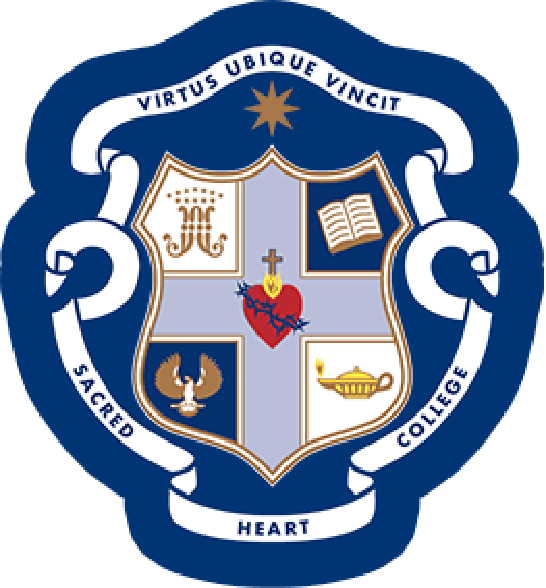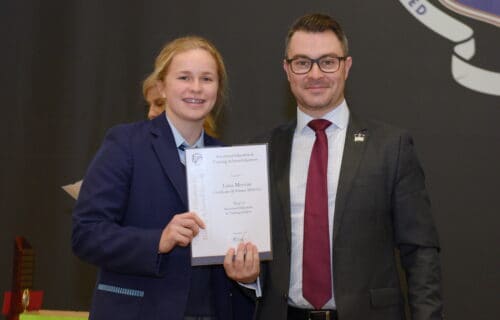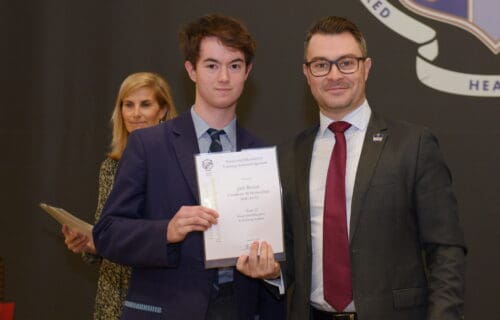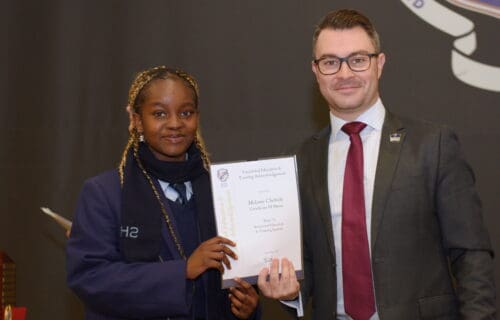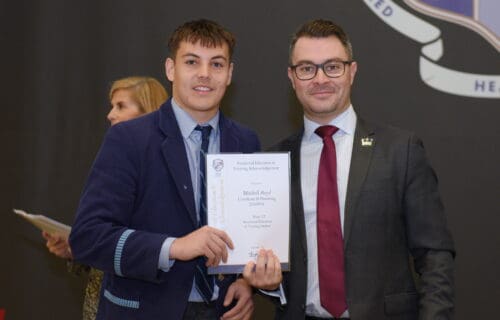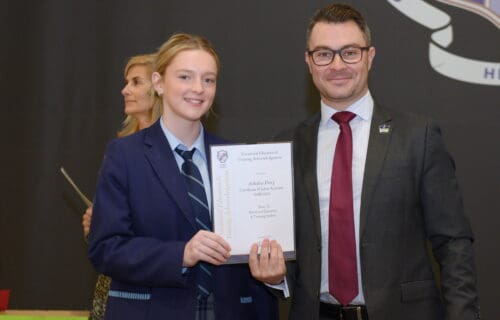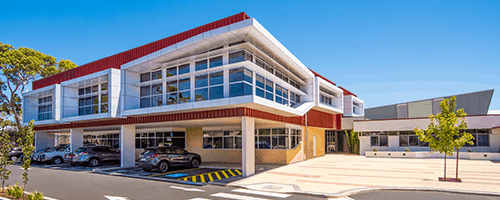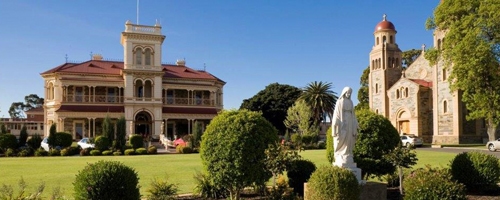
Students completing a school based apprenticeship: (L-R) Mackenzie Stock, Jack Hatwell, Harrison Brooks, Max Dwyer, Lucy Cooper, Riley Brigmanis and Jayden Betterman.
To our Sacred Heart Community
Completing a school based apprenticeship
In 2022 , the College has had a small number of students commencing or continuing school based apprenticeships and traineeships in a variety of areas at a Certificate III level, which equates to Stage 2.
School based apprenticeships and traineeships are part of the VET landscape and can follow on from VET once students are certain of the career path that they wish to take. A school based apprenticeship or traineeship combines school, paid work and training, and this year we have had 11 students start their career within a Certificate III apprenticeship or traineeship contract. This arrangement requires students to juggle the demands of their employer, their schooling and their training provider, which requires a lot of organisation and commitment on the students’ behalf. It also needs the help and support of teachers, which our staff generously provide to the students.
The following students are to be congratulated on the successful progression of their careers alongside their schoolwork, and for representing Sacred Heart in a positive light across a range of different industries. Unfortunately, not all students were able to attend the assembly due to work or training commitments.
| NAME | QUALIFICATION | WORKPLACE |
|---|---|---|
| Jack BARTLETT | Certificate III Carpentry | INCA Constructions |
| Jayden BETTERMAN | Certificate III Screen & Media | Football Federation SA |
| Riley BRIGMANIS | Certificate III Plumbing | Master Plumbers Association |
| Harrison BROOKS | Certificate III Electrotechnology/ Electrician | SOE Solutions Pty Ltd. |
| Lucy COOPER | Certificate III Hairdressing | YOTS Hair |
| Max DWYER | Certificate III Sports Turf Management | Glenelg Turf Ace |
| Noah HASKETT | Certificate III Landscape Construction | Freeman Landscaping |
| Jack HATWELL | Certificate III Painting & Decorating | Hatwell Painting Adelaide |
| Darcy MINCHELLA | Certificate III Plumbing | Progression Plumbing |
| Bodie RYAN | Certificate III Electrotechnology | National Building Fitouts |
| Mackenzie STOCK | Certificate III Engineering Fabrication | Specialised Solutions |
Here is what a few students had to say about their experience of doing a school based apprenticeship:
Has doing a school based apprenticeship been a good experience for you?
Yes, I’ve learned something new every day at work and grown in self-confidence. I enjoy the work and feel happy about becoming a fully qualified tradie. Without this school based apprenticeship I would have probably left school. It’s been good to keep in contact with my mates, develop my skills and confidence. Going into the workforce you gain maturity and realise what the school has done for you and it gives you a better perspective on the workplace. It has also been good to be part of a group training organisation because I have someone who oversees my apprenticeship that I can speak to and helps to organise things, especially important with a school based apprenticeship because there is a lot to keep on top of.
Any advice for the school or other students?
If you don’t like school that much but you like hands-on learning and work, try to get into a training arrangement as soon as you can. Start your Research Project prior to Year 12 so that you can progress with it in the one day that you do attend school.
Key Dates
-
Work Experience for 2022
BEFORE CONSIDERING WORK EXPERIENCE PLEASE BE AWARE OF THE FOLLOWING:
It is a legal requirement that prior to commencing Work Experience students are inducted in the following areas: Work Health and Safety Act 2012 SA, Children and Young People (Safety) Act 2017 SA, Sex Discrimination Act 1984 SA, Equal Opportunity Act 1984 SA and Child Safety (Prohibited Persons) Act 2016 SA. Adequate time (approximately 5 hours) should be allocated to cover these topics effectively and students need to demonstrate their understanding. This induction is done by the College and is consistent with our Duty of Care to ensure that no student is placed where they may not be safe physically or psychologically.
In addition to this, the Work Experience form must be signed by the student, work placement provider, parent/guardian (all arranged by the student) and finally, the Principal or delegate (arranged by the school). The original Work Experience Agreement form then becomes a legal contract which sets the College insurance cover in place and must be retained by the school.
The College must also provide a contact person who is responsible for each student for the duration of their placement.
Work Experience is a very valuable opportunity for most students however, it does take time to ensure that the above expectations are met. We are happy to accommodate students in the times allocated. Please do not cause yourself or the College embarrassment by making other arrangements and then asking for exceptions to be made.
Students who wish to do Work Experience during 2022 are advised that the dates are:
21 – 25 November (Optional Work Experience Year 12s only)
Deadline for paperwork: 21 October5 – 9 December
Deadline for paperwork: 4 NovemberUnpaid work trials should only occur if it’s necessary to evaluate a worker’s suitability for a job. They should only consist of the worker demonstrating their skills relevant to the job’s required tasks or observation of others performing the work.
Please note this is general Work Experience only. Students undertaking a VET program will need to organise their VET work placement with the VET Office.
-
Flinders Creative Arts | Livestream Information Session
Tuesday 4 October
4.00 – 4.30pm
OnlineJoin a current Creative Arts student to find out more about what it’s like studying Creative Arts at Flinders. They will cover entry requirements, course content, placement opportunities and specialisation options.
Find out more here. -
Flinders Game Production | Livestream Information Session
Wednesday 5 October
1.00 – 1.30pm
OnlineGet an inside look at the new Game Production course at Flinders University. They will cover entry requirements, course content, placement opportunities and specialisation options.
Find out more here.
-
Camp America | Online Information Session
Tuesday 11 October
7.00 – 8.00pm
OnlineSummer Camps are looking for you! Teach your skills all summer, make a difference and meet great mates on your next adventure. Stop dreaming and start your next adventure from home.
Join Camp America for an online information session from the comfort of your home!
They’ve got heaps of tips and tricks to make your dreams reality and make your application stand out. Get a full rundown of what your Camp America Experience could look like. Summer 2023 is waiting for you!
Find out more here.
-
ICHM Discovery Day
Thursday 13 October
9.30am – 3.30pm
International College of Hotel Management, Regency ParkAn ICHM Discovery Day could be for you! ICHM Discovery Days aim to get you thinking differently about your post school studies and career development, covering a range of exciting topics including international business and tourism, luxury hotel design and hospitality opportunities.
Find out more here.
-
Scholarships for undergraduate study at University and TAFE
Opens 13 October 2022
The Playford Memorial Trust supports high-achieving South Australian students working in areas of strategic importance to the State. This year, the Trust and its partners across industry, government, the education sector and the community will provide more than $700,000 in scholarships, internships and awards to university undergraduates, Honours, Masters and PhD students, as well as to students at varying levels of TAFE.
Playford Trust scholarships are available for Year 12 students intending to commence their university study next year, and will open on 13 October 2022. Please find further information about the scholarships for rural students, students interested in STEM and or space at this link.
Resources Engineering Scholarships 1st year uni Playford Trust
-
NIDA | Acting for Years 11-12
Sunday 16 October, 11.00am – Sunday 4 December, 1.30 pm
Christian Brothers College, AdelaidePractice skill-based learning led by industry experts across a range of performing arts disciplines. NIDA courses for Year 11 and 12 students are designed to support and inspire young people at any stage of their creative development. Students are able to join at the start of any term during the year.
Term 4, 2022: Modern Epics
From ancient Greeks to modern-day heroes, uncover the world of scripts and staging as you travel through the theatrical canon. Gain experience within a professional rehearsal process led by a NIDA tutor and apply voice, movement and character analysis techniques to your performance. Stage a selection of short scripted works for your invited audience at the end of term.Find out more here.
-
TAFE SA | Arts and Design Information Sessions
Wednesday 2 November
6.00 – 8.00pm
TAFE SA, Adelaide CampusFind out more about the following courses on offer at TAFE SA:
- Advanced Diploma Program in Applied Fashion Design and Merchandising (Generalist)
- Certificate III in Applied Fashion Design and Technology
- Bachelor of Creative Arts (Fashion) – Flinders University
- Bachelor of Creative Arts (Costume Design) – Flinders University
Find out more here.
-
National Computer Science School 2023
Wednesday 4 January 2023, 12.00 noon – Friday 13 January 2023, 12.00 noon
The University of New South Wales, SydneyThe National Computer Science School (NCSS) is a 10 day summer school for students going into Years 11 and 12. NCSS brings together talented young people from around Australia for an intensive course of computer programming and website development at university.
NCSS has been offered in various formats since 1996 (formerly at the University of Sydney). In 2023, NCSS will be running concurrently at the University of Melbourne and at their new Sydney home, UNSW.
NCSS is organised by Grok Academy together with their host universities. The school is completely residential, with all students staying with NCSS staff in full-board accommodation provided on campus.
Applications close 30 September.
Find out more here.
-
University of Adelaide Commonwealth Hill Trust Scholarship in Agricultural, Animal & Veterinary Sciences
Value: Up to $10,000 AUD
Open/Closing Dates: 16 January 2023 – 17 February 2023The trustees of the Commonwealth Hill Trust have established the Commonwealth Hill Trust Fund to support students with a passion and desire to pursue a career in agricultural sciences, animal science, animal behaviour, veterinary technology or veterinary medicine at the University of Adelaide.
Find out more here.
Vocational Education & Training (VET) Update – September 2022
VET Assembly
The annual VET Assembly was held at Marcellin Campus on Wednesday 7 September. The College acknowledged 79 students who are on track to obtain a Level III Certificate through their VET studies this year. This included many Year 12 VET students, a number of Year 11 students and one Year 10 student. In addition, we acknowledged all remaining Year 12 students who are studying VET at various Certificate levels.
The College also announced the Year 12 VET student of the year, Jake Underwood, who has been undertaking Advanced Carpentry this year and completed Certificate II Construction in 2021.
Well done to all on their fantastic achievements in VET this year!
VET student obtains an apprenticeship in 2023

Year 11 VET student, Nicholas Mourcella, completed his VET work placement in the July school holidays with Australian Professional Electrical Services. He impressed the business so much that he has been offered a full time apprenticeship with them commencing in 2023!
Nicholas received the following positive feedback from his supervisor: “Nick was a pleasure to have around the work group, was polite and courteous to staff and clients, and performed tasks with enthusiasm”.
Well done Nicholas!
Tertiary Updates
-
New Degrees at Flinders University | Bachelor of Creative Industries (Music)
The Bachelor of Creative Industries (Music) (SATAC Code: 244621) is aimed at students who are interested in working in the music industry (promotion, management, administration), or forging a career as an independent artist or producer.
Students will learn from artist management professionals, music promotions and marketing, label owners and representatives of recording studios. They will develop their recording and performance skills, create music videos and develop and implement marketing strategies informed by the latest research.
More information about the Bachelor of Creative Industries (Music) can be found here.
-
New Degrees at Flinders University | Bachelor of Information Technology (Digital Forensics)
The Bachelor of Information Technology (Digital Forensics) (SATAC Code: 244641) will cover specialist studies in Forensic Science, Digital and Computer Forensics, Forensic Criminalistics, Internet and Network Forensics, Mobile Device Forensics, Evidence Evaluation and Crime Scene Management, plus all the knowledge in the regular Bachelor of Information Technology.
Students will develop all the necessary applied and practical skills for a broad range of careers in digital forensics. Careers opportunities include security infrastructures development, network and cyber attack prevention, and working with law enforcement with cyber crime investigations.
This degree includes a 6 week industry placement for students to gain first-hand industry experience. All Bachelor of Information Technology and Bachelor of Computer Science degrees are accredited by the Australian Computer Society at the professional level.
More information about the Bachelor of Information Technology (Digital Forensics) can be found here.
-
New Degrees at Flinders University | Bachelor of Creative Industries (Game Production)
The Bachelor of Creative Industries (Game Production) (SATAC Code: 244601) is a hands-on degree with an emphasis on the creative aspects of game production.
Students will develop an in-depth knowledge of the games industry, the game design pipeline and the history, aesthetics and societal impact of games and gaming. Through the creation of assets for use in the game design pipeline with topics in game art, game narrative and game design, students will develop the essential skills in game production using industry standard software and game engines.
In this degree students will work alongside industry and collaborate with other students on real-world games and VFX projects preparing them for a fulfilling career in this growing industry.
More information about the Bachelor of Creative Industries (Game Production) can be found here.
-
Flinders University Enhanced Campus Tours
The Enhanced Campus Tours for Year 12s will be running in the October school holidays.
Please register here.
The structure of the event is an interactive presentation from a prospective student advisor with time for questions on degrees, pathways and careers, followed by a Flinders Uni student showing the apps and support systems students use, as well as a campus tour.
Training & Work
-
Trainee & Apprentice Placement Service (TAPS)
Trainee & Apprentice Placement Service (TAPS) is a Group Training Organisation that are reaching out to schools who may have students interested in plumbing, roof plumbing, refrigeration and other construction apprenticeships.
TAPS employ over 150 apprentices and trainees each year and have great opportunities for school leavers and for school based apprenticeships. They encourage these individuals to apply through their online website here.
For more information, visit www.tapssa.com.au or call their office on 8433 1200.
-
Subway | Glenelg and Harbour Town
Subway Glenelg and Harbour Town are accepting applications for casual positions. They are looking for anyone over the age of 14 that has a passion for customer service. No experience required, flexible hours and training provided. They are recruiting for multiple locations, please send your resumes to:
Harbour Town: Subwayharbourtwn@gmail.com
Glenelg: Subwayglenelg@gmail.com
-
Aviation Career in the Navy
An aviation career in the Navy is one of the most unique opportunities in Australia.
Students will be able to experience some of the world’s most technologically-advanced helicopters, choosing from a variety of Navy aviation roles in the cockpit, in trades, or as support. You will receive a competitive salary package, benefits, opportunities for continuous progression, job security and an adventurous lifestyle.
No experience is needed, you’ll be paid to gain all the skills needed for the role and if you have relevant experience or qualifications, you may be eligible for recognition of prior learning.
Browse the roles below to find out more about an aviation career in the Navy:
Explore Navy Aviation Roles:
Aviation Technician/Aviation Systems Technician: Maintain the most technically-advanced helicopters in Australia. You will be responsible for the maintenance, repair and overhaul of aircraft systems, equipment and components for the Seahawk Romeo helicopters.
Helicopter Mission Commander: Take the jump seat in a state-of-the-art Navy helicopter working alongside the pilot to manage navigation, tactical communications, weapons, and sensor systems.
Drone Mission Commander: Operate advanced tactical drones participating in surface warfare, search and rescue missions and amphibious operations on-board ships or at Navy Air Stations.
Flight Deck Marshall: Plan, execute, secure and oversee all helicopter ground handling on Navy squadron flight lines and on-board the ship’s flight deck and hangars.
Helicopter Pilot: Operate some of the world’s most sophisticated helicopters, taking to the sky to accomplish diverse missions at sea and ashore. You’ll be performing duties such as landing safely on moving ships at sea, search and rescue, medical evacuation or hovering above submarines.
Aircrew: Operate and manage the sensors, weaponry and radar on-board a Navy helicopter. You’ll be a key part of the action contributing to the success of a range of missions including search and rescue, aerial weapon support, casualty evacuation and combat operations.
For more information on aviation roles, email navyjobs@dfr.com.au, call 13 19 02 or head to the Aviation Link: Defence Jobs website -
Tradies in the Navy
The Navy needs tradies to repair and maintain a wide range of military hardware on ships, submarines, helicopters and ashore.
Whether you are an apprentice, or have no experience at all, they’re hiring. You’ll be paid to gain all the skills needed with extensive on-the-job trade training. You may also be able to utilise your existing qualifications and be eligible for recognition of prior learning.
Browse their trade roles:
Electronics Technician/Electronics Technician Submariner: Maintain, diagnose and repair some of the world’s most advanced tech and military hardware. Your role will be to ensure the Navy’s electronic circuits and systems are kept in peak working order.
Marine Technician/Marine Technician Submariner: You will operate, monitor and maintain engineering systems and machinery to ensure equipment and technical systems onboard run at optimum capacity.
Chef/Chef Submariner: Work in a dynamic team environment in the most exclusive kitchens in Australia, cooking, planning and prepping food on-board ships or submarines. Maintain the high quality of meals provided and cook with exotic ingredients when posted to sea.
Aviation Technician/Aviation Systems Technician: Maintain the most technically-advanced helicopters in Australia. You will be responsible for the maintenance, repair and overhaul of aircraft systems and components for the Seahawk Romeo helicopters.
For more information on aviation or tradie roles, email navyjobs@dfr.com.au, call 13 19 02 or head to the Defence Jobs website.
Spotlight on Careers
-
How to become a Border Force Officer
Border Force Officers are responsible for maintaining the security and safety of the country and people. They do this by patrolling air and seaports, cargo centres, and even regional and remote areas.
If you are dedicated and resilient, have a high level of integrity and professionalism, and want to help keep people safe, becoming a Border Force Officer could be perfect for you.
About you:
- Physically fit
- Strong work ethic
- High level of integrity
- Resilient
- Great team worker
- Calm under pressure
- Excellent communicator
- Reliable and mature
The job:
- Processing passengers and crew in air and seaports
- Inspecting and clearing incoming and outgoing cargo
- Seizing unlawful or prohibited goods
- Patrolling the coastline via sea or air
- Investigating illegal border activities
- Locating and detaining unlawful non-citizens
- Working in detention centres
- Training and working with detector dogs
Lifestyle Impact: High
- Part Time opportunities: Low – around 20% of Border Force Officers work part-time (source: labourmarketinsights.gov.au).
- Average hours for full-time workers: 41 hours a week, which is average (source: labourmarketinsights.gov.au).
- Border Force Officers’ salary (median) $85,000* per year (source: ato.gov.au). *Salaries vary depending on your skills and experience.
- Future career growth: Strong (source: labourmarketinsights.gov.au).
- Depending on operational requirements, you may need to move for work. This also includes potentially being posted to a different location at short notice.
- The job can be stressful at times, and you may be dealing with some difficult behaviour and dangerous items.
- You will be expected to commit to the values and behaviours of the Australian Border Force, including restrictions on certain body modifications (including tattoos and piercings).
Border Force Officers are most in demand in these locations:
Border Force Officers are employed by the Australian Government, and work all around the country, wherever people are entering and leaving Australia. Border Force Officers typically work in the Public Administration and Safety industry.
How to become a Border Force Officer
To become a Border Force Officer, you will need to undergo a recruit training program with the Australian Border Force (ABF).
Step 1 – Complete Year 12 with a focus on English and Maths.
Step 2 – To apply for the Border Force Officer Recruit Training (BFORT) program, you will need to be at least 18 years of age and hold a minimum Certificate IV or Diploma-level qualification (in any field), or have relevant work experience.
Step 3 – As part of the recruitment process, you will need to undergo a variety of testing, including medical, fitness, psychological, and security assessments, as well as an interview.
Step 4 – If your application is successful, you can begin the 12-month training course, which includes a mix of theoretical and practical learning.
Step 5 – Upon completion of training, start working as a fully-qualified Border Force Officer.
Step 6 – With lots of experience, you might like to consider specialist roles in the future.
Find out more here.
Interesting Stuff
-
Resources for parents
This link is to a parents and guardians guide to supporting school leavers. It is put together by the Australian Government and covers a range of different topics and also offers a variety of links for further information and online access. In addition there is a school leaver’s kit available.
This link is to a website created and managed by the Queensland Education Department. It is called Spark their future and it has a wealth of resources about a host of different topics relevant to parenting teens and literally “sparking their future”. Topics range from mental health, decision making, anger management, bullying, homework, subject selection and the list goes on. It will have a Queensland flavour but the actual resources are excellent and from a wide variety of experts.
-
CCUSA | Global Work, Summer Camp and Volunteer programs | Daniel Cagney CCUSA Camp Counselors USA – Award
CCUSA offer Gap year programs for 18 – 35 year old’s. Their Summer Camp program is the largest in Australia. Summer camp work is demanding, but the rewards are endless. CCUSA take great care in placing every participant at the right camp or employer. Whether Work, Camp or Volunteer you will receive individual and professional customer service from their staff who have all completed a CCUSA program.
Find out more here.
Daniel Cagney – CCUSA Camp Counselors USA – Award
In memory of Daniel Cagney, Past student at Sacred Heart College, Camp Counselors USA program participant and Camp Counselor at Camp Pinewood in North Carolina.
In recognition of Daniel’s outstanding commitment to youth through his work as an American Camp Counselor, CCUSA is honoured to offer the Daniel Cagney – CCUSA Camp Counselors USA – Award.
Every year from June, graduating Year 12 students from Sacred Heart College will be eligible to receive this Award by applying and being accepted to the CCUSA Camp Counselors USA program for the following year.
All students who apply and are successfully accepted to the program by 31 January will go into the draw to receive the Award.
The recipient will be drawn at the “Formal Friday – Suit Up” event which is run in conjunction with Beyond Blue by Daniel’s Family, in February each year.
The recipient will receive a $250 reimbursement from the CCUSA Camp Counselors USA program and the honour of continuing Daniel’s legacy of his commitment to children at summer camps in the USA.
-
First Pitch Competition
First Pitch calls on budding young entrepreneurs aged up to 18 to enter their best business pitch for the chance to win great prizes.
You can submit a 3-minute pitch on a business innovation or idea that can make a difference in your community and Australia wide. Your pitch will be judged by a local panel of entrepreneurs and business professionals, and the state winners get to participate in the national championship.
Entries are open until Sunday 9 October at 11.59pm.
Find out more and enter here.
-
Young Endeavour Youth Scheme
The Young Endeavour Youth Scheme is pleased to announce that applications for youth development voyages in STS Young Endeavour from January – June 2023 are now open!
Since 1988, more than 14,000 young Australians aged 16 – 23 have joined national sail training ship Young Endeavour on a life-changing voyage.
Each voyage in Young Endeavour is a unique and challenging experience. The immersive nature of the program encourages participants to rapidly develop interpersonal, leadership and teamwork skills which are readily transferable to their life as they move into adulthood.
Twenty four youth from across Australia make up the youth crew, they come from all parts of Australia and all walks of life. Together these new crew mates learn how to sail a tall ship. Importantly, the youth crew don’t have access to their phones or social media, allowing them to focus on their rapid introduction to life at sea. They learn how to keep watch on deck, to handle lines, take the helm, navigate using the ship’s electronic charts, assist the chef in the galley and climb the 30 metre mast to set and furl sails. No sailing experience is required, only a willingness to give everything a try.
The program is delivered by the professional Royal Australian Navy staff crew who ensure that the highest standards of safety are maintained. During the voyage the staff crew encourage youth to pursue personal and team goals and challenges. By the end of each voyage, the youth crew have developed the skills, knowledge and confidence to elect a leadership team to take command of the ship over a 24 hour period.
Voyage fees and conditions will apply to successful applicants. A limited number of financially assisted berths are available for eligible youth.
Applications can be made online now.
-
Applying to University in the US from Australia
Applying to university in the US is quite a long and complex process. If you’re considering studying in the US, then you’re going to have to be prepared to do a bit more research and spend even more time on your applications.
Your best starting point
It is highly recommend heading over to the US Embassy website to start your planning.
There are over 4,700 universities and colleges in the States, with over 1,000,000 international students landing there each year, so the US Government is all over the international student market and there’s tonnes of information out there to help you.
(Note: the terms ‘college’ and ‘university’ are interchangeable terms in the US tertiary education system).
You can also contact the US Consulate offices in Melbourne, Sydney and Perth who’ll be able to help you with student visas and all the other official paperwork.
Step 1 – Research all your options
Find out where you can study, what course options are on offer, and start making a list so you can narrow down all your options. Location and costs might also play a role.
Register and attend any information sessions about studying in the USA or virtual open days. Remember you can always contact the unis directly with any questions or queries too.
It’s recommended that you start this as early as Year 11 to give yourself plenty of time to make the best choice for you.
Using a spreadsheet is a great way to keep track of all your research. You could include columns for:
- Admission dates – for all decision types (Early Decision, Early Action and Regular Decision)
- Standardized tests – which test(s) are required; what are the minimum score(s)?
- Costs – both tuition and accommodation
- Scholarships – include deadlines and application links
- Application type – which application is used (e.g. CommonApp)
- Application requirements – e.g. personal statement; letter of recommendation; five adjectives that best describe you, etc.
- International admissions department – record a contact person/email address for any queries
- Financial aid deadlines
For student-athletes you’ll also need to include:
- Coach – name and contact information
- Team roster information
You’ll need 5-8 universities on your Shortlist
Because there are so many universities in the US, it is recommend that you narrow down your options to avoid confusion. It’s recommended you narrow your list down to:
- 1-2 dream colleges
- 2-4 competitive colleges
- 2 safe colleges
Step 2 – Apply
Unlike here in Australia, there is no centralised application centre for university applications (such as UAC). This means you need to apply to each university or college individually.
It is recommend that you get in touch with the international admissions department of the university or college you’re interested in ASAP. This way you can ask about admission requirements and dates so you don’t miss out.
Prepare your documents
Each college and university in the US might ask for different documents for admission, but most typically require:
- Standardized scores: including SAT and ACT test scores. Check if it’s a requirement where you want to apply and make sure you register and prepare for the test. You can take the test more than once, so if you don’t get a great score the first time around, don’t fret.
- Letters of recommendation: Many colleges require two or three letters of recommendation, which must be from trusted adults who know you. These typically come from recent teachers or careers advisors, but can also come from club or team coaches, members of organisations you’re a part of outside of school, or employers.
- Personal statements and essays: institutions in America look beyond your exam results. Your personal statement and other essays provide you with an opportunity to highlight all your good bits and achievements, particularly any extra-curricular activities you take part in.
- Academic transcripts: You’ll need your transcripts from high school, and any other academic institutions you might have been enrolled in like TAFE or MOOCs. They should list your qualifications, grades, and other achievements.
- Application form: You’ll probably have to complete an application form for each university you’re applying for. This will usually include your personal details as well as parent or legal guardian information.
- Financial information: You might have to provide information about your family’s financial situation to see if you qualify for scholarships and so they can make sure you’ll be able to pay the bill if not. The deadline for financial information might be later than the application deadline, but it’s always good to double-check.
Keep track of any key dates
Just like uni applications here in Australia, it’s vital that you keep a close eye on any key dates and ensure you get all your paperwork in on time.
Application dates vary by university, but most generally close around the beginning of January.
- Applications open for most US universities in early August.
- SAT and ACT Tests are run throughout the year with several dates.
- Early Action/Early Decision Deadlines are early November for most universities.
- Final Deadlines are in early January for most universities.
- You will need to accept your offer by 1 May.
See the below timeline – stick it up on your wall to help you keep on track.
Early Action vs Early Decision
If you’d like to get your application in early, you have two options: early action and early decision. But what’s the difference?
Put simply, if you apply for early decision, you must accept any offer you’re given. If you reject the offer then change your mind, you must go through the application process all over again.
Through early action, you may receive an early offer, but you don’t necessarily need to accept it. You’re free to wait as long as you need to accept, even until you’ve received other regular offers. However, there are very few universities in the US that take early action applications.
Offers
There are no conditional offers to study in the US – you will either be offered a place, which means you’re in as long as you accept, or rejected, which means you now have a couple of options.
If you are sent an offer, all you need to do now is accept. Make sure you do this before the deadline (usually 1 May for the Fall/Autumn semester) or your offer will lapse and you will need to reapply. Keep in mind that you can reject an offer if you don’t want it, or have received an offer from a different university.
If your application is rejected, you might be put on a waitlist. This means if other students have been offered a place but don’t accept, there could be a place free for you. It’s not a guarantee, but might be worth waiting it out to see if you can grab a spot.
If your application is rejected and you’re not offered a spot on a waitlist, this means you’ll need to reapply in the next admissions cycle.
Complete a free application course
To help you really get to grips with the application systems, EducationUSA recommends you complete this free online course. It’s a four-week online course especially developed for international students, regardless of which US institution you want to attend.
Step 3 – Find out about Student Visa requirements
To live and study in the US, you’ll need to obtain a Student Visa. This can be quite a complex process with a lot of paperwork involved, so it is recommend you start doing your research as soon as possible.
Once you’re accepted into a university, they will start sending you the paperwork to begin the Visa application process.
A great place to start for information is the Department of Homeland Security’s Study in the States website. You can also get assistance from a US Consulate in Australia.
Here are some things to keep in mind with your Visa application:
- You might need to prove that you have sufficient funds to cover your study to be approved.
- Be prepared to fill out a lot of paperwork, both before and after you arrive in the US.
- You will need to attend an interview at a US Consulate. The interview must be attended in-person, as fingerprint scans are taken.
- There are costs involved.
Step 4 – Research and apply for any Scholarships, grants, and bursaries for international students
Just like here in Australia, universities and other providers in the US offer a variety of scholarships and grants to help you fund your studies.
To find scholarships, the best place to look is on the website of the university you’re interested in or contact them directly.
See more about scholarships and financial support here.
Step 5 – Plan where you’ll be living
If you get into a uni in the US, the next thing you’ll need to do is find accommodation. Like here in Australia, you can choose between on-campus accommodation at the university, or private accommodation somewhere else.
Read more about the types of accommodation available in the US here.
Other resources
Check out these websites for more information and resources on studying in the US:
-
Thought for the day | Life is like Cricket
The rules matter.
It’s a long game.
Nothing happens, then everything happens!
Disclaimer: Statements on careers and courses included in this newsletter are not necessarily those of Sacred Heart College. i.e. The text of notices on courses and industry prospects may be taken directly from their correspondence/publicity material. Some material taken from Study Work Grow (South Australia Careers News).


